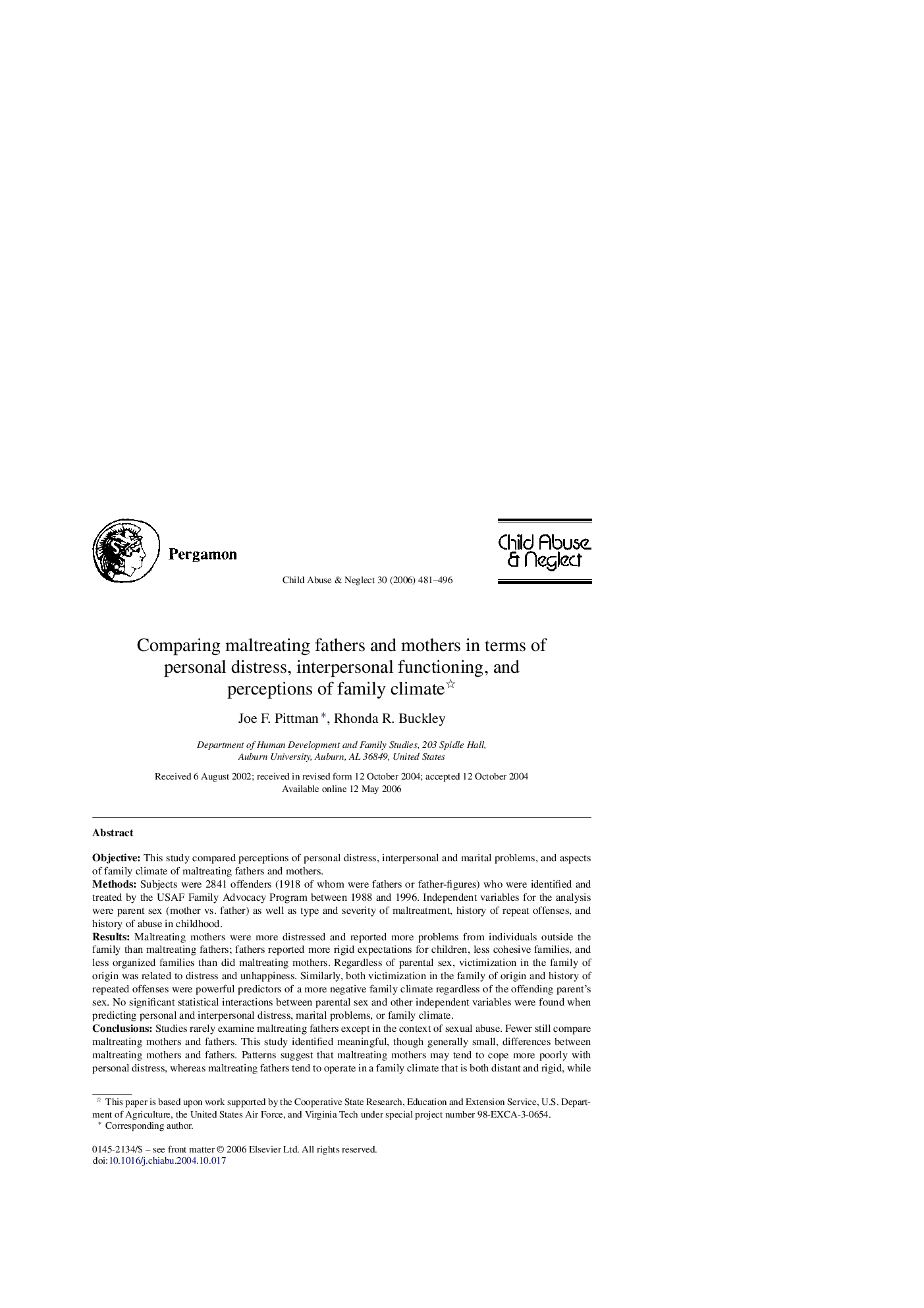| کد مقاله | کد نشریه | سال انتشار | مقاله انگلیسی | نسخه تمام متن |
|---|---|---|---|---|
| 345545 | 617528 | 2006 | 16 صفحه PDF | دانلود رایگان |

ObjectiveThis study compared perceptions of personal distress, interpersonal and marital problems, and aspects of family climate of maltreating fathers and mothers.MethodsSubjects were 2841 offenders (1918 of whom were fathers or father-figures) who were identified and treated by the USAF Family Advocacy Program between 1988 and 1996. Independent variables for the analysis were parent sex (mother vs. father) as well as type and severity of maltreatment, history of repeat offenses, and history of abuse in childhood.ResultsMaltreating mothers were more distressed and reported more problems from individuals outside the family than maltreating fathers; fathers reported more rigid expectations for children, less cohesive families, and less organized families than did maltreating mothers. Regardless of parental sex, victimization in the family of origin was related to distress and unhappiness. Similarly, both victimization in the family of origin and history of repeated offenses were powerful predictors of a more negative family climate regardless of the offending parent's sex. No significant statistical interactions between parental sex and other independent variables were found when predicting personal and interpersonal distress, marital problems, or family climate.ConclusionsStudies rarely examine maltreating fathers except in the context of sexual abuse. Fewer still compare maltreating mothers and fathers. This study identified meaningful, though generally small, differences between maltreating mothers and fathers. Patterns suggest that maltreating mothers may tend to cope more poorly with personal distress, whereas maltreating fathers tend to operate in a family climate that is both distant and rigid, while holding inappropriate expectations for children's behavior. The absence of interactions between parental sex and the other independent variables included in the analysis indicate that these patterns do not vary by the history of victimization in the family of origin, the type or severity of child maltreatment, or the history of prior maltreatment in the family.
ResumenSpanish-language abstract not available at time of publication.
RésuméObjectifCette étude a comparé des mères et de pères qui maltraitent leurs enfants, au niveau de leurs perceptions de leur détresse personnelle, leurs difficultés interpersonnelles et maritales et certains aspects du climat familial.MéthodeLes sujets de l’étude étaient 2.841 parents maltraitants (dont 1.918 étaient des pères ou qui faisaient figure de père) connus du programme d’aide aux familles de l’armée américaine, entre 1988 et 1996. Les variables indépendantes étaient le sexe du parent ainsi que la nature et la gravité de la maltraitance, des incidents de maltraitance répétés et une anamnèse de mauvais traitements subis en enfance.RésultatsLes mères maltraitantes étaient plus détressées et avouaient vivre un plus grand nombre de difficultés interpersonnelles hors-famille que les pères maltraitants. Les pères se disent avoir des attentes plus rigides vis-à-vis de leurs enfants, un milieu familial moins cohésif et moins bien organisé que ceux des mères. Peu importe le sexe du parent, le fait d’avoir été maltraités eux-mêmes en enfance occasionne de la détresse et une absence de bonheur. De même, une anamnèse de maltraitance et le fait d’avoir maltraité fréquemment constituent des facteurs importants pouvant prédire un climat pénible, tant chez les mères que chez les pères maltraitants. Aucune interaction statistique importante n’a été notée entre le sexe du parent et d’autres variables indépendantes, lorsqu’il s’agissait de prédire la détresse personnelle et interpersonnelle, les difficultés conjugales et le climat familial.ConclusionsIl est rare de trouver des études qui examinent les pères maltraitants, sauf dans le contexte de l’agression sexuelle. Encore plus rares sont celles qui comparent les pères et les mères maltraitants. Cette étude a noté de légères différences, bien qu’importantes. Il semblerait que les mères ont tendance à conjuguer pauvrement avec la détresse personnelle tandis que les pères semblent pouvoir fonctionner dans un climat familial impersonnel et rigide et favorisent des attentes irréalistes vis-à-vis le comportement de leurs enfants. L’absence de liens entre le sexe du parent et autres variables indépendantes qui ont fait l’objet de cette étude dénote que l’anamnèse, la nature et la gravité des mauvais traitements et les incidents antérieurs de maltraitance n’affectent pas ces tendances.
Journal: Child Abuse & Neglect - Volume 30, Issue 5, May 2006, Pages 481–496